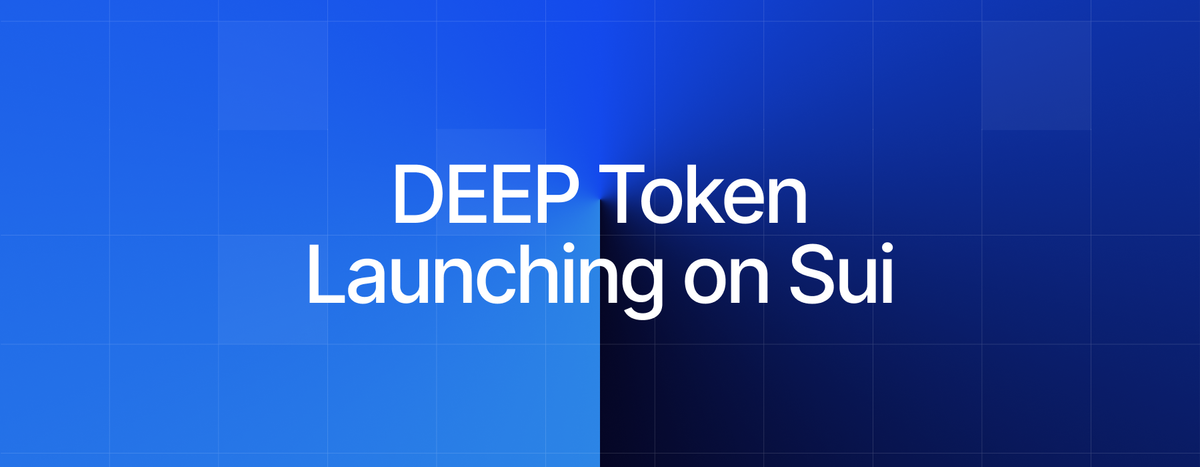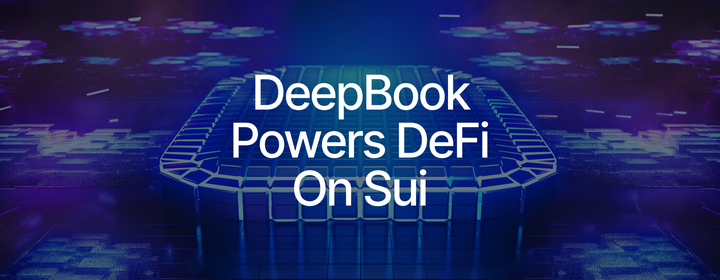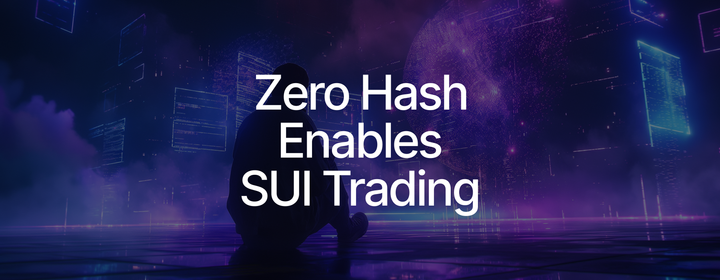DeepBook Previews Token Launch with NFT Airdrop
DeepBook NFT recipients will be able to claim the DEEP token when it launches.

DeepBook, Sui's first native liquidity layer, is launching its own native token, DEEP, reinforcing its position as key financial infrastructure for the Sui network. DEEP is designed for institutions and institutional traders using DeepBook to provide wholesale liquidity in DeFi. The combination of DeepBook and DEEP delivers the preeminent venue in Web3 for sourcing liquidity by DeFi apps.
Key features of the DEEP token include volume-based fees and maker incentives. Participating in those features requires that users reach specific staking thresholds in DeepBook pools. Those users will also contribute to governance of those pools by staking their DEEP tokens.
DeepBook's fully on-chain central limit order book architecture allows DeFi protocols and professional traders to access its pools and offer a range of rich retail services. Along with market token orders, users can place limit orders in DeepBook pools, allowing for sophisticated trading functionality. Deepbook delivers an efficient foundation for DeFi, supporting liquidity and unlocking avenues for innovation in financial products.
The DEEP token will officially launch later this year. In the meantime, DeepBook developed a unique soulbound NFT, called DBClaimNFT, made available on March 28. Recipients of this NFT will be able to unwrap it and obtain liquid, fungible DEEP tokens upon token launch.
Designed for wholesale trading
The DEEP token's design incentivizes DeepBook's many diverse participants to work together in offering ample and around-the-clock liquidity, strengthening wholesale liquidity. It will contribute to DeepBook's foundational liquidity for DeFi protocols. This design includes features geared towards institutional users.
Volume-based fees: While anyone can trade on DeepBook, the fees these traders pay decrease incrementally with respect to the trader’s activity in that pool. This allows institutional traders, DeFi protocols, and other active participants to pay low fees on the margin, whereas infrequent traders pay higher fees and would likely use DeFi protocols or brokers instead.
Maker incentives: DeepBook's liquidity providers, called makers, receive extra DeepBook token-denominated incentives, which, in the aggregate, decrease in the amount of total liquidity provided in a given epoch. This allows DeepBook to maintain consistent liquidity depth even in periods that would otherwise see low liquidity.
Stake-based participation: Participation in the two programs above (discounted fees and incentives) for a given pool requires traders to stake a minimum number of tokens in the pool in advance and for the duration of the epoch. These stakes earn no explicit rewards. Any trader that does not stake this minimum number both will pay the standard fee to trade in that DeepBook pool and will be ineligible for maker incentives emanating from the pool. This upfront capital requirement further positions DeepBook as a hub for wholesale rather than retail liquidity.
Stake-based governance: Separately, stakers in a given pool control governance for that pool. Specifically, parameters around fees and maker incentives for a given pool will be controlled by stakers in that pool, with governance rights that increase with stake weights.
Protecting users
Many DeFi protocols are designed such that they inadvertently incentivize two self-serving behaviors from liquidity providers, wash trading and governance capture. Wash trading involves creating artificial volume to take advantage of volume discounts, while governance capture may let traders set rules favorable to themselves, at the expense of other users. The new token includes key protections in anticipation of these exploits.
As protection against wash trading, tokens collected in an epoch by a given pool can never be less than tokens distributed in that epoch by that same pool, with the delta being burned. In addition, total incentives decrease sharply in the amount of total activity, blunting a trader's economic incentive to send artificial volume.
DeepBook mitigates governance capture by limiting rules setting to simple parameters. For example, while traders can vote for cheaper fees, that vote would apply to all fee schedules, eliminating the potential for targeted fee schedules that only benefit certain users. Further checking governance capture, governance rights do not increase at a linear rate in relation to stake quantity, with staking amounts delivering decreased rights above certain thresholds. This mechanism maintains a voice for smaller traders in the system.
Full details of the DEEP token, including its allocation and flows, can be found in the DeepBook Token whitepaper.
DEEP FAQ
- Was the airdrop delivered to the wallet or is it on a claim site?
- A DeepBook token claim is represented by an NFT sent to a qualified user’s wallet address. Recipients will be able to unwrap the NFT and obtain DEEP tokens when the DEEP token officially launches.
- How can we tell if the DBClaimNFT we received is real?
- The DeepBook website and twitter account will have the address that represents the DBClaimNFT collection.
- Can I transfer or sell the DBClaimNFT?
- The DBClaimNFT is a soulbound NFT, meaning it cannot be sent to another wallet address or traded. The DBClaimNFT is permanently attached to the wallet address it was sent to.
- My NFT is on a wallet I can’t access, what can I do?
- Unfortunately, if you have lost the private keys for the wallet which contains your DBClaimNFT you will not be able to claim your DB tokens when they are live.
- When can I use my DBClaimNFT to claim tokens?
- In the future, once the DEEP token officially launches, users will be able to send a transaction to unwrap their DBClaimNFT and obtain liquid DEEP tokens.
- Why did you decide to create a token? What is the purpose?
- The DeepBook token was created to support the aim of the DeepBook platform becoming the premier decentralized central limit order book (CLOB) for wholesale liquidity on the Sui platform. The token enables DeepBook to better provide a reliable and inexpensive layer of liquidity for protocols and professional participants on Sui to access, while also allowing that layer to be decentralized. This makes DeepBook a valuable public good to the community, providing key financial infrastructure that is inexpensive for users, benefits ecosystem-wide liquidity, and supports the rich consumer-facing DeFi platform.
- What features does the token have? What is the utility?
- There are four key flows for the DeepBook token: volume-based taker fees, maker incentives, stake-based participation, and staked-based governance. Please see the DeepBook token whitepaper for more details on each.
- What is the distribution of the token?
- Is the token mintable?
- All of the tokens will be minted at the Token Generation Event (TGE) and will not be mintable into the future.
- Are you able to transfer the claim to the NFT?
- No, the claim NFT is soul-bound and tied to the address it was sent to.
Note: This content is for general educational and informational purposes only and should not be construed or relied upon as an endorsement or recommendation to buy, sell, or hold any asset, investment or financial product and does not constitute financial, legal, or tax advice.



